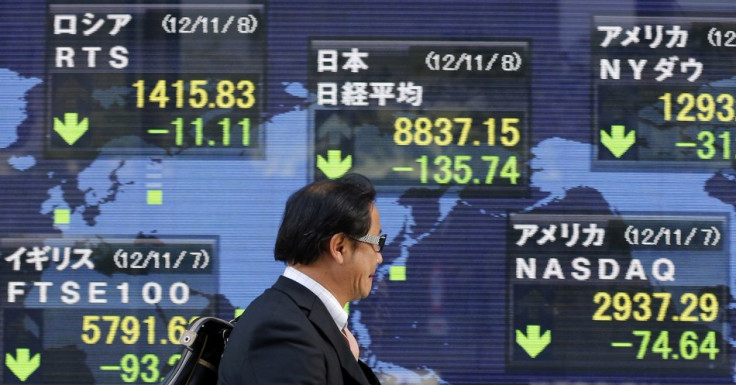Global Stocks Hit Post-Lehman Peak as Investors Become Central Bank Bulls

Global stocks touched their highest levels since the collapse of Lehman Brothers this week as investors continue to bet on deeper central bank support in the face of tepid economic data and rising political risks.
The multi-year and record high closes for global stock benchmarks contrast an economic recovery that appears increasingly fragile. Japan barely avoided recession in the final three months of last year, government data indicated Friday, while Britain will be lucky to avoid its third recession in four years and European Central Bank President Mario Draghi again lowered growth forecasts for the Eurozone following the ECB's interest rate decision Thursday. With the gap between stock performance and real economic growth expanding, some experts are cautioning that its main driver - low interest rates and quantitative easing - are masking the underlying fundamentals.
"Much of the recovery so far has in any case been heavily reliant on 'easy money' conditions fostered by central banks," the Institute of International Finance said in its monthly Capital Markets Monitor. "These conditions cannot last forever, but the risk is that financial markets have become addicted to them. The fact that the Dow Jones Industrial Average rose to a record high this week is more a reflection of these relaxed international monetary conditions than a signal of strong recovery in the 'real' economy."
The broadest benchmark for global stock performance, the MSCI World share index, hit a four and a half year peak of 360.6 points in European trading Friday following a breach of 8,000 by Germany's main share index, the DAX, earlier in the session and the highest post-Lehman close for Japan's Nikkei 225. Earlier this week, the Dow Jones Industrial Average reached its highest-ever close of 12,329.49.
"We are betting on the stock market," said Bill Gross, the co-chief investment officer of PIMCO, the world's biggest bond fund, during an interview with CNBC. "But we think it's a baby-bull, not a magnificent bull. We like stocks, but the fact is that credit at some point runs into a dead end in terms of its ability to engender real growth and profits. And so we're basically at that point in our view."
Aside from the diminishing returns of zero-bound interest rate strategies from the world's biggest central banks, investors should also be concerned about the collective political risks materializing around the world, says the IIF, which cites the current electoral gridlock in Italy and the potentially damaging consequences of the ongoing partisan fiscal debate in the United States. Political tensions in North Korea, which has vowed to continue with provocative military exercises in defiance of the United Nations Security Council and the increasingly bloody civil war in Syria, which could escalate into a far more dangerous regional conflict, also appear to be not priced into the current equity rally.
There's even hidden danger in some of the good economic news of late, argues Barclays economist Michael Gavin, who cites the example of Thursday's better-than-expected jobless claims figures from the United States, which indicated sustained labour market improvements in the face of subdued economic growth.
"This is potentially bad news for bond and equity investors. For bond investors, the bad news is obvious. If low productivity growth leads to persistently higher growth in unit labour costs," he wrote in research report published Friday. "Inflationary pressures could reduce the Fed's room for monetary manoeuvring. For equity investors, an acceleration in unit labour costs poses obvious risks as well."
The current stock market rally, however, is likely to continue in the near term, says PIMCO's Gross, and there does appear to be fundamental evidence to support that conclusion: China's exports grew at an annual pace of 21.8 percent last month, official figures published Friday said, even though New Year celebrations took four working days from the calendar. Global commodity prices have largely stabilized this year, corporate balance sheets outside the financial sector are solid and mergers and buyouts are advancing at their fastest pace in several years.
Furthermore, argues Gross, "rotations from bonds to stocks work with a three to six month lag. It takes that long for quarterly statements to change attitudes and allocations among investors," he told CNBC. "Since November 15 stocks have begun to outperform bonds by about 10 percent and that should lead to additional allocations."
© Copyright IBTimes 2025. All rights reserved.





















